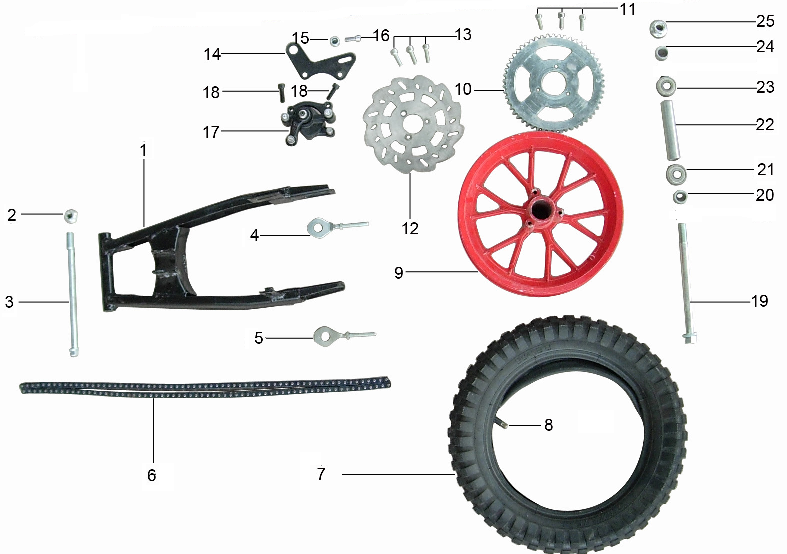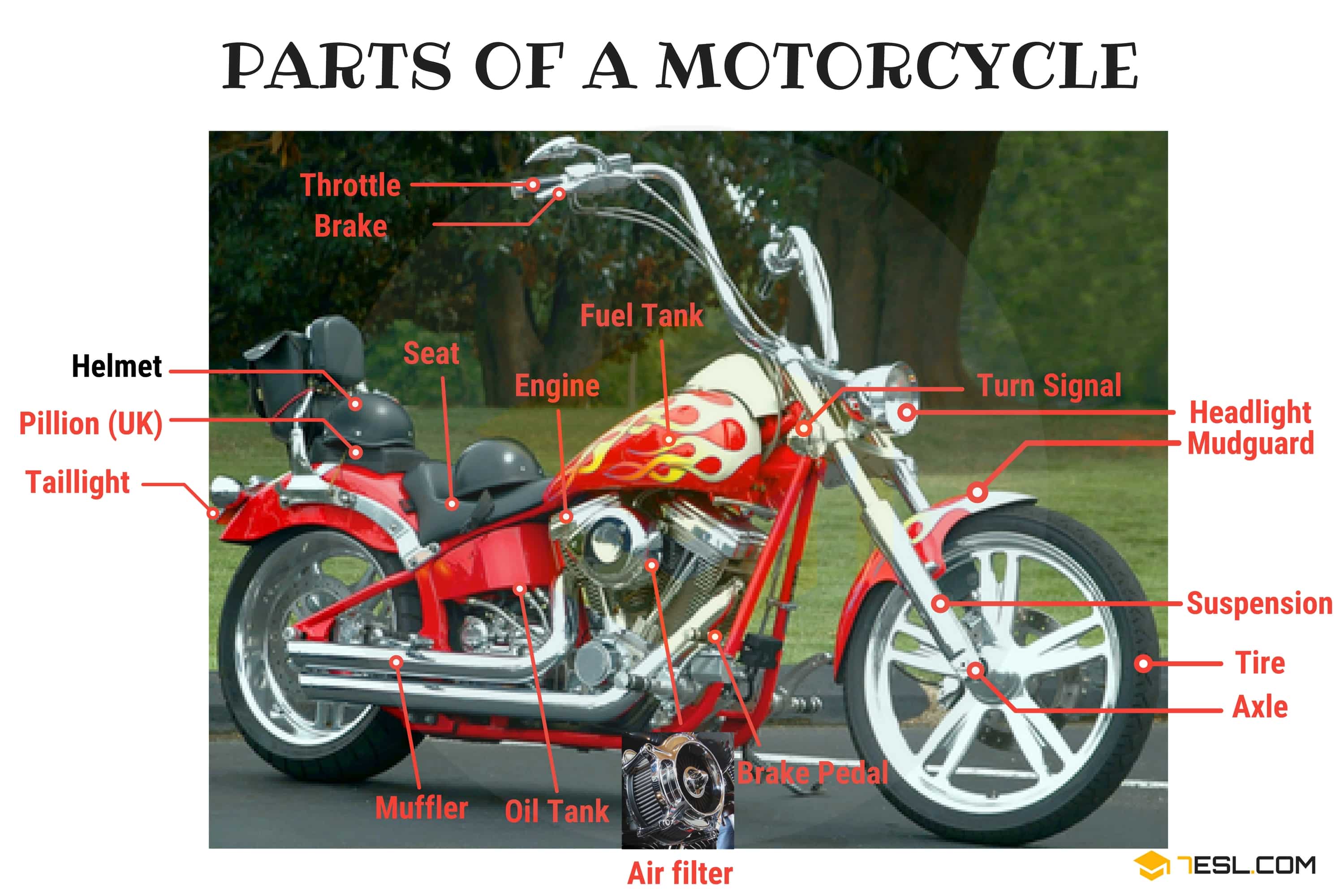How to Tell If Your Motorbike Components NZ Are Causing Performance Loss
Discover the Vital Motorcycle Components You Need for Ideal Efficiency
Understanding the vital parts of a motorbike is basic for achieving peak performance. Each element, from the engine to the braking system, plays a critical role in overall functionality and safety and security. Regular upkeep can prevent unexpected failures and improve the riding experience. Numerous bikers overlook the intricacies of these systems. Finding how they interact can lead to a more efficient ride. What vital parts should every biker focus on?
The Engine: The Heart of Your Motorcycle
The engine acts as the core element of a motorbike, driving its performance and specifying its capacities. It is responsible for transforming gas right into power, which powers the bike onward. Various kinds of engines are employed, including single-cylinder, V-twin, and inline configurations, each offering distinct attributes suited for various riding functions and designs. The engine dimension, typically determined in cubic centimeters (cc), considerably affects performance, with larger engines generally providing more power and torque.Furthermore, the engine's design and innovation, such as gas injection systems or air-cooling versus liquid-cooling, impact effectiveness and dependability. Maintenance is essential for peak procedure; variables like normal oil adjustments and checking spark plugs guarantee long life. Motorcyclists often consider an engine's responsiveness and smoothness, as these features improve the general riding experience. Ultimately, the engine continues to be a vital element that specifies not only the motorcycle's performance but likewise the cyclist's connection to the machine.
The Transmission: Changing Gears Efficiently
The transmission plays a crucial function in a motorbike's efficiency, especially in the technicians of equipment changing. Recognizing exactly how to change equipments smoothly can enhance the general riding experience, while routine maintenance assurances peak functionality. Proper attention to these facets can considerably affect the durability and efficiency of the bike.

Equipment Shifting Mechanics
Smooth gear changing is crucial for suitable motorcycle performance, significantly influencing both velocity and control. The auto mechanics of equipment changing include the communication in between the clutch, equipment bar, and transmission system. When a rider engages the clutch, it disengages the engine from the transmission, enabling an equipment adjustment without damaging the components. A well-timed launch of the clutch, combined with exact activity of the equipment bar, helps with a seamless change between equipments. This procedure assures that the engine runs within its best power band, improving performance. Motorcycle Spares Christchurch. In addition, understanding the gear ratios and their effect on rate and torque can aid riders make educated selections during shifts, ultimately adding to a more pleasurable and receptive riding experience
Maintenance Tips Significance
Regular upkeep plays a crucial function in guaranteeing that the transmission system runs effectively, allowing for smooth gear shifts. On a regular basis examining and transforming the transmission liquid is vital, as old fluid can lead to increased friction and wear. Additionally, examining the clutch for wear warranties peak interaction and disengagement, preventing slippage throughout gear modifications. Lubrication of moving parts is equally important to minimize rubbing and improve efficiency. Motorbike proprietors should additionally keep an eye on for leakages and uncommon sounds, as these can suggest underlying issues. By sticking to these maintenance ideas, riders can lengthen the life expectancy of their transmission system, assuring that equipment changes continue to be seamless and adding to the overall efficiency of their motorbike.
The Braking System: Ensuring Safety And Security on Every Ride
Braking systems are essential parts that directly influence a motorbike's safety and efficiency. They are composed of different components, including brake pads, blades, calipers, and hydraulic lines, all functioning together to ensure efficient deceleration. The kind of stopping system-- generally either disc or drum-- affects responsiveness and quiting power.Regular upkeep is vital to copyright peak efficiency; worn brake pads can lead to decreased performance and raised stopping distances. Furthermore, the high quality of brake fluid ought to be kept track of, as it can take in wetness with time, compromising stopping efficiency.Riders must also think about the importance of anti-lock braking systems (ABDOMINAL), which protect against wheel lockup during abrupt quits, improving general safety and security. Appropriately operating brakes are not just concerning stopping; they impart confidence in the cyclist, permitting more secure navigation with different terrains. Eventually, a reputable braking system is crucial for delighting in every adventure with comfort.
The Suspension: Enhancing Convenience and Control
A well-functioning suspension system considerably contributes to a motorbike's overall efficiency, matching the performance of the stopping system. The suspension plays a considerable duty in soaking up shocks from uneven surface areas, guaranteeing a smoother trip while maintaining tire contact with the road. This call is necessary for both stability and control, allowing riders to browse edges with confidence and precision.Different kinds of suspension systems, such as telescopic forks or mono-shocks, use varying degrees of convenience and handling. Correctly tuned suspension boosts responsiveness, providing the motorcyclist with a much more connected feeling to the motorbike. Regular maintenance checks are necessary to determine the suspension elements, consisting of dampers and springtimes, are functioning at their best. An efficient suspension system not only elevates the riding experience however also adds to the long life of various other motorcycle components by lessening damage. Consequently, buying high quality suspension is crucial for any serious motorcycle enthusiast.
The Tires: Linking You to the Road
Tires play a vital duty in a motorbike's performance, functioning as the key link between the road and the rider. Recognizing the different sorts of tires offered can significantly impact managing and safety and security. Furthermore, normal maintenance is essential to ensure peak tire efficiency and long life.
Tire Enters Explained
Just how do different tire types affect a motorcycle's performance? Tire kinds play a vital function in figuring out a motorcycle's handling, security, and grip. Sport tires, developed for high performance, deal boosted traction and responsiveness on paved roads, making them ideal for racing and hostile riding. Alternatively, visiting tires focus on longevity and convenience, supplying a smoother experience for long-distance traveling. Off-road tires, defined by their sturdy tread patterns, succeed in traction on unpaved surfaces, appropriate for experience fanatics. Furthermore, dual-sport tires blend features from both on-road and off-road categories, catering to functional riding requirements. Inevitably, choosing the right tire type is important for optimizing performance, ensuring safety and security, and improving the overall riding experience.
Upkeep Tips Offered
While riding on the road, preserving excellent tire problem is important for navigate to this site security and performance. On a regular basis checking tire stress is essential, as under-inflated tires can result in poor handling and increased wear. It is advisable to inspect tread deepness often; worn tires concession hold and security. Additionally, bikers ought to seek signs of damage, such as cracks or bulges, which can indicate the demand for replacement. Rotating tires regularly ensures also use, enhancing durability. Keeping tires tidy from particles and preventing extreme visuals can lengthen their lifespan. Lastly, maintaining proper alignment and equilibrium contributes to come to a head performance, minimizing stress and anxiety on various other bike components. Abiding by these maintenance ideas will significantly enhance the total riding experience.
The Fuel System: Fueling Performance and Performance
The gas system plays an important role in making best use of a motorbike's performance and effectiveness, as it guarantees the optimal delivery of gas to the engine. It comprises several important components, consisting of the gas tank, gas pump, gas filter, and gas injectors or carburetor. Each part needs to operate successfully to guarantee a smooth and powerful ride.The gas storage tank shops fuel and supplies it to the engine through the fuel pump, which creates the needed pressure. A fuel filter avoids contaminants from entering the engine, while the injectors or carburetor mix gas with air for combustion.Proper upkeep of the fuel system is crucial; a stopped up filter or malfunctioning injector can lead to lowered efficiency and raised gas intake. By confirming that the fuel system runs effectively, riders can enjoy enhanced throttle reaction, far better gas economy, and on the whole improved riding experience.
The Electric System: Powering Your Trip
An effective electric system is important for the overall performance and safety and security of a motorbike, as it powers crucial components such as the ignition, lights, and different digital systems. This system consists of the battery, which shops energy, and the alternator, in charge of producing power while the engine runs. The electrical wiring harness attaches these parts, making sure trusted power distribution.Additionally, fuses secure the system from overloads, while relays aid regulate high-current gadgets with low-power signals. A properly maintained electric system improves efficiency by ensuring smooth starts and consistent operation of lights and signals, crucial for cyclist visibility and safety.Regular checks of the battery's charge and links are very important for preventing electric failures. Motorcyclists ought to additionally inspect electrical wiring for damage, guaranteeing all parts operate ideally. Eventually, a robust electrical system contributes substantially to the total performance and dependability of the motorcycle.
Frequently Asked Inquiries
How Usually Should I Change My Bike's Battery?
The regularity of bike battery substitute relies on usage and maintenance (Motorcycle Parts Auckland). Usually, batteries should be replaced every three to 5 years. Regular checks can help identify when a substitute is necessary for peak efficiency
What Devices Do I Need for Standard Motorbike Maintenance?
For basic motorcycle maintenance, one needs important devices such as an outlet set, wrenches, screwdrivers, pliers, tire pressure scale, and a torque wrench. These tools facilitate effective maintenance and ensure the motorcycle runs efficiently and safely.
Just How Can I Boost My Motorbike's The rules of aerodynamics?
To boost motorbike the rules of aerodynamics, one should consider changing fairings, utilizing windscreen expansions, enhancing body setting, and reducing overall weight. These modifications aid decrease drag, enhancing stability and gas effectiveness during rides.
What Are the Indicators of a Failing Electrical System?
Indicators of a failing electric system include dimming lights, problem starting, irregular instrument readings, and blown integrates. Motorcycle Parts Auckland. Uncommon smells or this website rust around battery terminals might likewise suggest underlying problems needing instant interest for security and efficiency

Exactly how Do I Choose the Right Oil for My Bike?
When selecting oil for a motorbike, one ought to consider the manufacturer's requirements, thickness scores, and the sort of riding. In addition, conventional versus artificial oil can affect efficiency and engine defense, affecting the choice substantially. The engine size, commonly gauged in cubic centimeters (cc), considerably influences efficiency, with bigger engines normally offering more power and torque.Furthermore, the engine's style and technology, such as gas injection systems or air-cooling versus liquid-cooling, influence efficiency and dependability. A well-functioning suspension system investigate this site considerably adds to a motorbike's overall efficiency, enhancing the efficiency of the braking system. The gas system plays a vital function in optimizing a motorcycle's performance and efficiency, as it guarantees the ideal distribution of gas to the engine. A fuel filter protects against pollutants from going into the engine, while the injectors or carburetor mix gas with air for combustion.Proper upkeep of the gas system is critical; a blocked filter or malfunctioning injector can lead to decreased efficiency and increased gas usage. A well-kept electrical system enhances efficiency by making sure smooth starts and constant operation of lights and signals, important for biker exposure and safety.Regular checks of the battery's cost and connections are essential for protecting against electric failings.